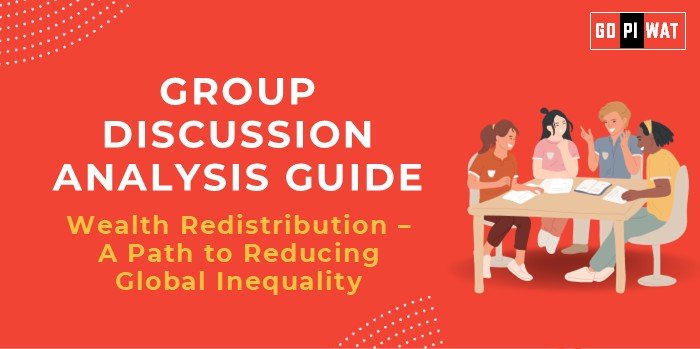📋 Group Discussion (GD) Analysis Guide
🌐 Introduction to Wealth Redistribution
- 💡 Opening Context: Wealth inequality has reached staggering levels globally, with the top 1% owning nearly half the world’s wealth. This disparity fuels debates about prioritizing wealth redistribution as a global strategy to reduce poverty.
- 🔍 Topic Background: Wealth redistribution refers to reallocating income and wealth from the rich to the underprivileged through mechanisms like taxation, welfare programs, and public services. The idea gained traction post-World War II and remains central to economic justice debates.
📊 Quick Facts and Key Statistics
🌍 Global Wealth Distribution: As of 2023, the top 1% of the world’s population holds approximately 46% of global wealth.
💸 Extreme Poverty: Over 700 million people live on less than $2.15 per day, the international poverty line.
📈 Wealth Accumulation: In 2023, the number of billionaires increased by 4% to 3,323, with their combined wealth reaching a record $12.1 trillion, a 9% increase from the previous year.
📊 Income Inequality: The Gini coefficient, a measure of income inequality, remains high in many countries, indicating significant income disparities.
💸 Extreme Poverty: Over 700 million people live on less than $2.15 per day, the international poverty line.
📈 Wealth Accumulation: In 2023, the number of billionaires increased by 4% to 3,323, with their combined wealth reaching a record $12.1 trillion, a 9% increase from the previous year.
📊 Income Inequality: The Gini coefficient, a measure of income inequality, remains high in many countries, indicating significant income disparities.
👥 Stakeholders and Their Roles
- 🏛️ Governments: Implement policies such as progressive taxation and social welfare programs to redistribute wealth and reduce poverty.
- 🌐 International Organizations: Entities like the World Bank and the United Nations develop frameworks and provide support for poverty reduction and equitable wealth distribution.
- 🏢 Private Sector: Corporations can contribute through fair wages, corporate social responsibility initiatives, and equitable business practices.
- 📢 Civil Society: Non-governmental organizations and advocacy groups play a crucial role in highlighting issues of inequality and pushing for policy changes.
🏆 Achievements and Challenges
✨ Achievements:
- 📉 Poverty Reduction: Between 1990 and 2015, the global population living in extreme poverty decreased from 36% to 10%.
- 📑 Social Programs: Conditional cash transfer programs, such as Brazil’s Bolsa Família, have successfully lifted millions out of poverty.
- 📈 Economic Growth: Some countries have achieved significant economic growth, leading to improved living standards and reduced poverty rates.
⚠️ Challenges:
- 📊 Rising Inequality: Despite economic growth, income and wealth inequality have increased in many regions.
- 💸 Tax Evasion: High levels of tax evasion and avoidance by wealthy individuals and corporations undermine redistribution efforts.
- 🚧 Policy Resistance: Political and ideological opposition to wealth redistribution policies can hinder implementation.
🌍 Global Comparisons:
- ✅ Success: Nordic countries, such as Sweden and Denmark, have effectively reduced inequality through comprehensive welfare systems and progressive taxation.
- ❌ Challenges: In contrast, countries like the United States have seen rising income inequality despite economic growth.
📖 Case Studies:
- 🇮🇳 India: Despite rapid economic growth, India continues to grapple with significant income inequality and poverty.
- 🇿🇦 South Africa: Post-apartheid South Africa has implemented various redistribution policies, yet it remains one of the most unequal societies globally.
🗨️ Structured Arguments for Discussion
- ✅ Supporting Stance: “Implementing global wealth redistribution is essential to address the widening gap between the rich and the poor, ensuring social stability and sustainable development.”
- ❌ Opposing Stance: “Wealth redistribution can discourage investment and innovation, potentially leading to economic inefficiencies and reduced overall wealth creation.”
- ⚖️ Balanced Perspective: “While wealth redistribution can mitigate extreme poverty and inequality, it must be carefully designed to avoid negative economic consequences and ensure that it promotes long-term growth.”
💡 Effective Discussion Approaches
🔑 Opening Approaches:
- “The fact that the top 1% owns nearly half of the world’s wealth raises critical questions about the fairness and sustainability of our global economic system.”
- “With over 700 million people living in extreme poverty, it’s imperative to explore whether wealth redistribution should be a global priority.”
📢 Counter-Argument Handling:
- Acknowledge concerns about potential economic drawbacks of wealth redistribution.
- Present evidence from countries where redistribution has led to positive social and economic outcomes.
- Highlight the role of well-designed policies in mitigating potential negative effects.
🔍 Strategic Analysis of Strengths and Weaknesses
📈 Strengths:
- Potential to reduce poverty and inequality.
- Can lead to increased social cohesion and stability.
- May stimulate economic demand through increased spending by lower-income individuals.
📉 Weaknesses:
- Risk of capital flight and tax avoidance by the wealthy.
- Potential disincentives for investment and entrepreneurship.
- Implementation challenges, including administrative costs and potential for corruption.
📊 Opportunities:
- Leveraging technology to improve tax collection and reduce evasion.
- International cooperation to address tax havens and ensure fair taxation.
- Developing policies that balance redistribution with economic incentives.
⚠️ Threats:
- Political resistance and ideological opposition.
- Economic downturns that reduce the available wealth for redistribution.
- Globalization leading to increased mobility of capital and individuals, complicating national redistribution efforts.
🎓 Connecting with B-School Applications
- 📚 Real-World Applications:
- Analyzing the impact of wealth redistribution policies on business environments and investment climates.
- Exploring corporate social responsibility initiatives aimed at reducing inequality.
- Studying the role of financial institutions in facilitating or hindering wealth redistribution.
- 🎤 Sample Interview Questions:
- “How can businesses contribute to reducing economic inequality?”
- “What are the potential impacts of wealth redistribution policies on global markets?”
- “Can you discuss a case where wealth redistribution led to positive economic outcomes?”
- 💡 Insights for B-School Students:
- Understanding the complexities of wealth redistribution is crucial for future business leaders, as it affects economic stability and consumer markets.
- Knowledge of these issues can inform strategies for corporate responsibility and ethical business practices.
- Awareness of global economic policies and their impacts can enhance decision-making in international business contexts.


